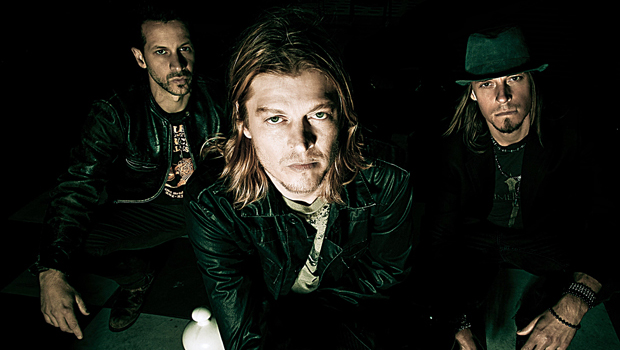Interview: Puddle of Mudd Guitarist Paul Phillips on 'Re:(Disc) Covered'
All the latest guitar news, interviews, lessons, reviews, deals and more, direct to your inbox!
You are now subscribed
Your newsletter sign-up was successful

In the early 2000s, Puddle of Mudd’s debut album Come Clean hit airwaves across the nation, bringing the grungy, Kansas City-based hard-rockers to the forefront of the commercial rock scene.
Singles like “Blurry,” “Drift & Die” and “Control” could be heard anywhere from car radios to wrestling arenas, and angsty, heartbroken audiences everywhere could relate to the rejection anthem, “She Hates Me.”
Since then, the threesome has released three studio albums, two compilations, taken home four Billboard Music Awards and has undergone a rotation of band members.
Now, 10 years after their first album, Puddle of Mudd are taking listeners back to the 1970s with their latest record, Re:(Disc) Covered -- a collection of classic rock favorites from The Rolling Stones to Elton John, done Puddle of Mudd-style.
Lead guitarist Paul Phillips recently talked to Guitar World about what to expect from the new album, what it was like redoing tracks that have earned a spot in rock 'n' roll history, and this fall's Rock Allegiance Tour, which sees the band hitting the road with Buckcherry, Papa Roach and others.
GUITAR WORLD: What made you guys want to release a covers album?
It kind of just fell into place. It was a process of where we needed to take some time off and our management and record label contracts came up. They were all four album deals so after our fourth record, it was time to get a new team in place that was going to continue with this so far. We were so frustrated with the last team that we just needed a break to concentrate on getting things back up and running.
All the latest guitar news, interviews, lessons, reviews, deals and more, direct to your inbox!
So we just toyed with the idea of doing a couple of covers that we’ve been doing live in out set forever. One thing led to another, and we were having fun and ended up compiling this list of 30 songs. We were just bouncing songs off each other via email and we weeded that down to 15, and then we weeded that down to the 11 that you hear on the record. So it’s not really something we set out to do, it just kind of happened as we went along. We just got the crazy idea to continue recording songs until we had a whole record.
I know you’re going to be on the Rock Allegiance Tour soon with Papa Roach and Buckcherry. Do you plan on playing a lot of these cover tracks or are you going to bring back more of your old stuff?
We’ll just treat it like any other record. We’ll play one or two and then the rest will be all our Puddle songs and our hits over the years.
How do you feel about being back on the road again?
Excited. It’s a good tour. There’s a lot of bands that we came up with over the years and have known for a while. And for the consumer’s dollar, it’s a lot of bands and a lot of hours for your buck. So I think it’s going to be good, it should be a fun little run.
I know you said some of these were songs that you played live. How did you go about choosing the other songs on the record?
Over a three-month period we just kind of shot songs back and forth. We wanted to do songs that had meant something to us, whether lyrically or that meant something to us in our childhood growing up. Or even musically as musicians, something we knew that would be challenging. Doing a cover record allows you to do things that are so far out of left field of what your band does. To me that was extremely exciting because it was challenging to tackle such different styles of music in such different instrumentation. And as an artist it’s always good to push your boundaries, so I had a lot of fun in that.
And it was about making sure you can choose songs that meant something, and not just going for a cheap song we thought maybe would be a hit single. Because that wasn’t our goal at all, it was just a record that’s fun to do for our fans. Hopefully they’ll dig it and will treat it for what it is, like a cool little collectors item. We hope to be in the studio in January to record our next original record.
So how do you think these songs will be received by your fans and fans of the original songs?
So far it’s been extremely positive, which is always a gamble when we do such timeless songs. But that was a risk we were willing to take in order to do songs that had a reason behind us doing them. I think some of the choices are going to really shock people, and that was a lot of the fun in choosing some of them. Like I said, we’re doing things that were so left field that we can’t do on our record. Hopefully a lot of people will be pleasantly surprised with how we took an effort to represent songs in their truest form.
And my goal was to go in and make a '70s record true to the spirit and true to the recording techniques, and I like to think that’s what we accomplished.
And when you say you’re doing things from “left field,” what exactly do you mean?
I mean Elton John is an odd choice for a modern rock, four-chord, grunge band. As well as “D’yer Mak’er.” It’s just not something people are going to expect from us.
Those are two in particular were really exciting because they were so different, and like I said, left field is what we do. So as a musician that’s exciting, and you sit back and say wow, I like that song but I wonder if we can pull it off because it’s so not what we do. So that’s what I mean when we say left field. People are going expect us to go to Nirvana or Metallica or something and that’s not what we do. We wanted to do other things that are a challenge to us, but also songs that we were still a fan of.
I know you took songs like “D’yer Mak’er” and “Rocket Man” that are more mellow and slow tempo, and you gave them a bit of an edge. What was it like working with those arrangements?
It was a lot of fun. Like I said, I think we kept most of them very true. I tried to represent every guitar part and make sure the vocal harmonies and the cool overdub melodies were represented. I really tried to stay true to what it was because they’re such timeless songs already, so there’s not too much you can do to them.
There are two where we took a few liberties here and there, like “Old Man” by Neil Young. It’s such a stripped-down acoustic song, and obviously we took that and added to that. But the majority of them are really close to how they were, just a little more modern sounding. And that’s just because of studio gear and recording techniques today.
What was it like trying to find your own voice and putting your own spin on these songs that are already so widely known?
It was fun. It was exciting, but at the same time like I said we tried not to have too much fun because they’re already so timeless. Like the solos and stuff that I do, I try to represent them pretty much how they were recorded. “Old Man,” which doesn’t have a guitar solo, allowed you to write a guitar solo for the song.
So it was both ends of being able to write and put your own stamp on it, and trying to tackle something and play it correctly. It made me play guitar and practice again like I haven’t done in a long time. It made the guitar inspiring to me again, as opposed to it being my job and what I do for a living.
How long did you spend on the album?
It took four and a half to five weeks for us to do it. We started rehearsals in January, did a couple of weeks of rehearsals, went in the studio and were done in about four to five weeks.
The new album of covers from Puddle of Mudd, Re:(Disc) Covering, is out tomorrow, August 30. You can pre-order the album here.

